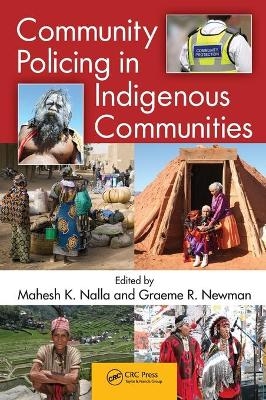
Community Policing in Indigenous Communities
Routledge (Verlag)
978-1-4398-8894-0 (ISBN)
Drawing on the local expertise of policing practitioners and researchers across the globe, the book explores several themes with regard to each region:
How community policing originated or evolved in the community and how it has changed over time
The type of policing style used—whether informal or formal and uniformed or non-uniformed, whether partnerships are developed with local community organizations or businesses, and the extent of covert operations, if any
The role played by community policing in the region, including the relative emphasis of calls for service, the extent to which advice and help is offered to citizens, whether local records are kept of citizen movement and locations, and investigation and arrest procedures
The community’s special cultural or indigenous attributes that set it apart from other models of community policing
Organizational attributes, including status in the "hierarchy of control" within the regional or national organization of policing
The positive and negative features of community policing as it is practiced in the community
Its effectiveness in reducing and or preventing crime and disorder
The book demonstrates that community policing cannot be imposed from above without grassroots input from local citizens. It is a strategy—not simply for policing with consent—but for policing in contexts where there is often little, if any, consent. It is an aspirational practice aimed to help police and communities within contested contexts to recognize that positive gains can be made, enabling communities to live in relative safety.
Mahesh K. Nalla is a professor at the School of Criminal Justice, Michigan State University in East Lansing. His research interests include police organizational and work cultures in the developed, emerging, and new democracies; trust and legitimacy of police in the new democracies; and private security in the emerging markets. His research has appeared in Justice Quarterly, Journal of Research and Crime and Delinquency, European Journal of Criminology, and Journal of Criminal Justice, among others. One of his major United Nations projects resulted in forming the cornerstone of the United Nations Economic and Social Council draft International Protocol Against the Illicit Manufacturing of and Trafficking in Firearms, Ammunition and Other Related Materials, as a supplement to the United Nations Convention Against Transnational Organized Crime. He is the editor-in-chief of the International Journal of Comparative and Applied Criminal Justice. Graeme R. Newman is a distinguished teaching professor at the School of Criminal Justice, University at Albany, and an associate director of the Center for Problem-Oriented Policing. He has advised the United Nations on crime and justice issues over many years and, in 1990, established the United Nations Crime and Justice Information Network. His major works include Super Highway Robbery with Ronald V. Clarke, Outsmarting the Terrorists with Ronald V. Clarke, Crime and Immigration with Joshua Freilich, Designing Out Crime from Products and Systems with Ronald V. Clarke, Policing Terrorism: An Executive’s Guide with Ronald V. Clarke, a new translation of Cesare Beccaria’s On Crimes and Punishments with Pietro Marongiu, Reducing Terrorism through Situational Crime Prevention with Joshua Freilich, and Crime and Punishment around the World in four volumes.
Africa and the Middle East. Bahrain. Gambia. Lebanon: Community Policing in Nahr al Bared Refugee Camp. Madagascar. Niger. Nigeria. South Africa. The Americas. Argentina. Canada: Aboriginal. Canada: The Annapolis Valley. Chile. Mexico. Peru. Trinidad and Tobago. United States—Indigenous Communities. Asia and Oceania. Police e Mardumi—Indigenous Civilian Policing at District Level in Afghanistan. Australia. Bangladesh. China: Indigenous Communities. India. New Zealand. Philippines. South Korea. Thailand. Europe. Croatia. Finland. Germany. Italy. The Republic of Moldova. Netherlands. Northern Ireland. Poland. Serbia. Slovenia. Spain. Turkey. Index.
| Zusatzinfo | 6 Tables, black and white; 2 Illustrations, black and white |
|---|---|
| Verlagsort | New York |
| Sprache | englisch |
| Maße | 178 x 254 mm |
| Gewicht | 816 g |
| Themenwelt | Informatik ► Netzwerke ► Sicherheit / Firewall |
| Recht / Steuern ► EU / Internationales Recht | |
| Recht / Steuern ► Strafrecht ► Kriminologie | |
| Recht / Steuern ► Strafrecht ► Strafverfahrensrecht | |
| Sozialwissenschaften ► Politik / Verwaltung | |
| Sozialwissenschaften ► Soziologie | |
| ISBN-10 | 1-4398-8894-9 / 1439888949 |
| ISBN-13 | 978-1-4398-8894-0 / 9781439888940 |
| Zustand | Neuware |
| Haben Sie eine Frage zum Produkt? |
aus dem Bereich


